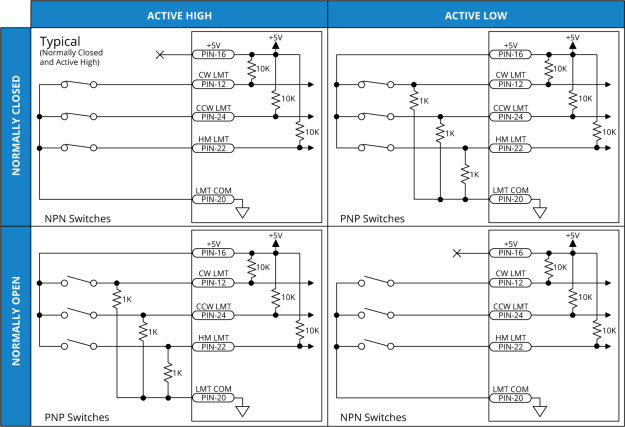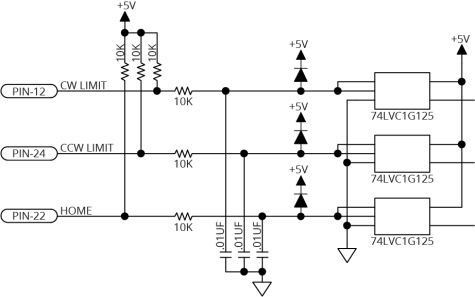End of Travel and Home Limit Inputs
End of Travel (EOT) limits are required to define the end of the physical travel on linear axes. Positive or clockwise motion is stopped by the clockwise (CW) end of travel limit input. Negative or counterclockwise motion is stopped by the counterclockwise (CCW) end of travel limit input. The Home Limit switch can be parameter configured for use during the home cycle, however, the CW or CCW EOT limit is typically used instead. All of the end-of-travel limit inputs accept 0-24 VDC level signals. Limit directions are relative to the encoder polarity in the diagnostics display (refer to End of Travel and Home Limit Input Diagnostic Display).
Table 2-23: End of Travel and Home Limit Pins on the Feedback Connector
|
Pin # |
Description |
In/Out/Bi |
|---|---|---|
|
12 |
Clockwise End of Travel Limit |
Input |
|
16 |
+5V Power (1) |
Output |
|
20 |
Signal Common |
Output |
|
21 |
Signal Common |
Output |
|
22 |
Home Switch Input |
Input |
|
24 |
Counterclockwise End of Travel Limit |
Input |
|
(1) The maximum combined current output is 500 mA. |
||
The active state (High/Low) of the EOT limits is software selectable (by the EndOfTravelLimitSetup parameter). End of Travel and Home Limit Input Connections shows the possible wiring configurations for normally-open and normally-closed switches and the parameter setting to use for each configuration.
IMPORTANT: Use NPN-type normally-closed limit switches (Active High) to provide fail-safe behavior in the event of an open circuit.
Figure 2-29: End of Travel and Home Limit Input Connections

Figure 2-30: End of Travel and Home Limit Input Schematic (Feedback Connector)
